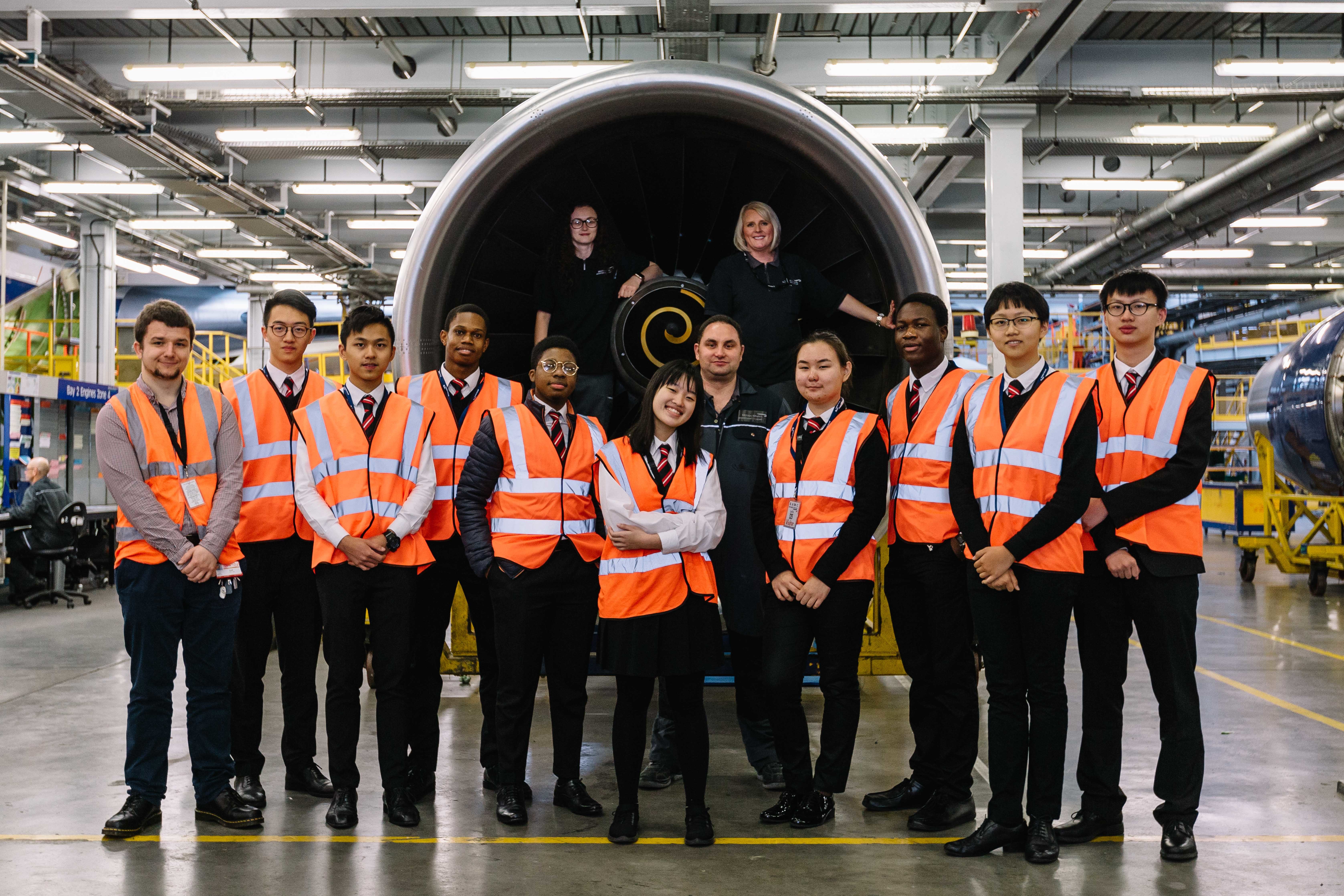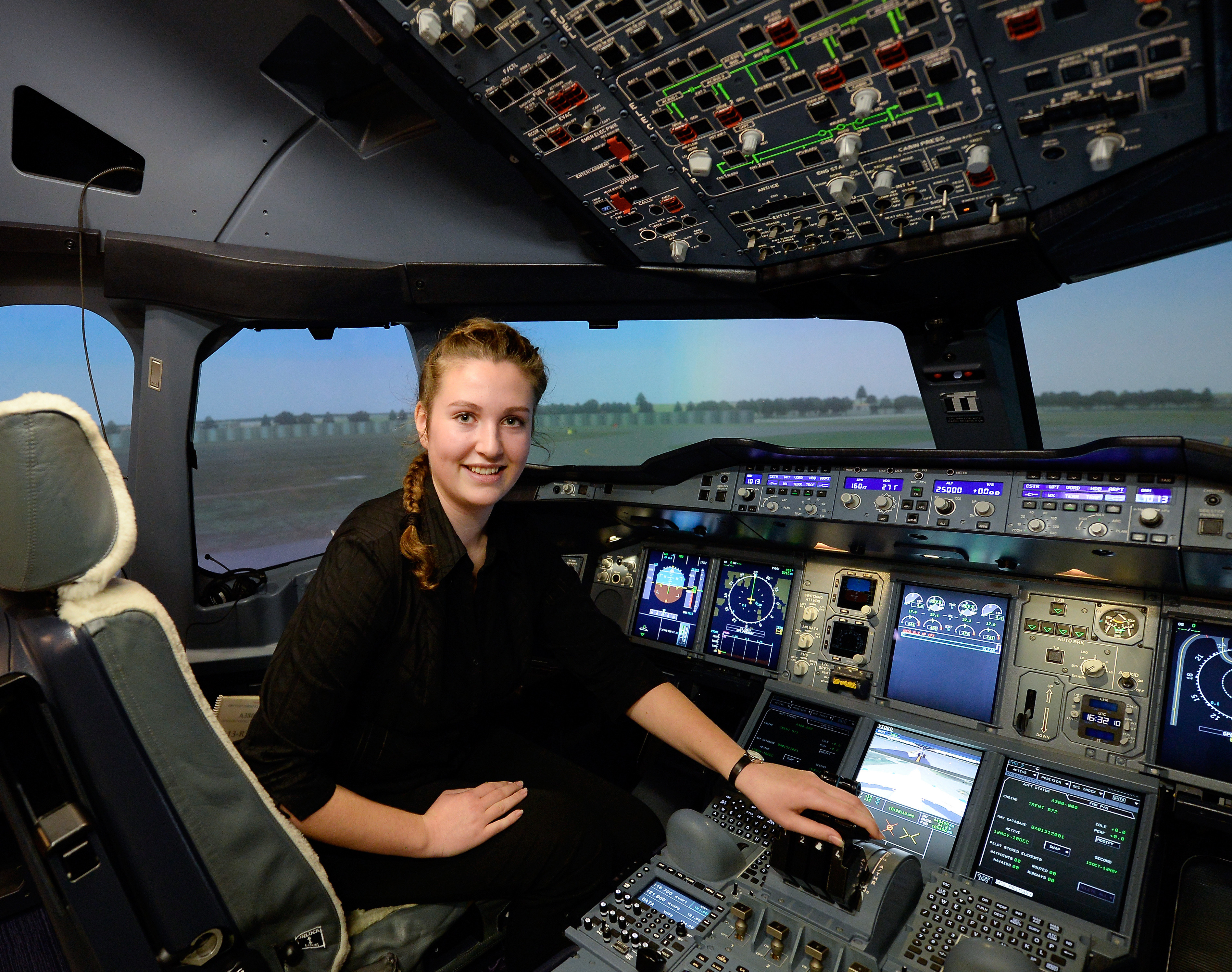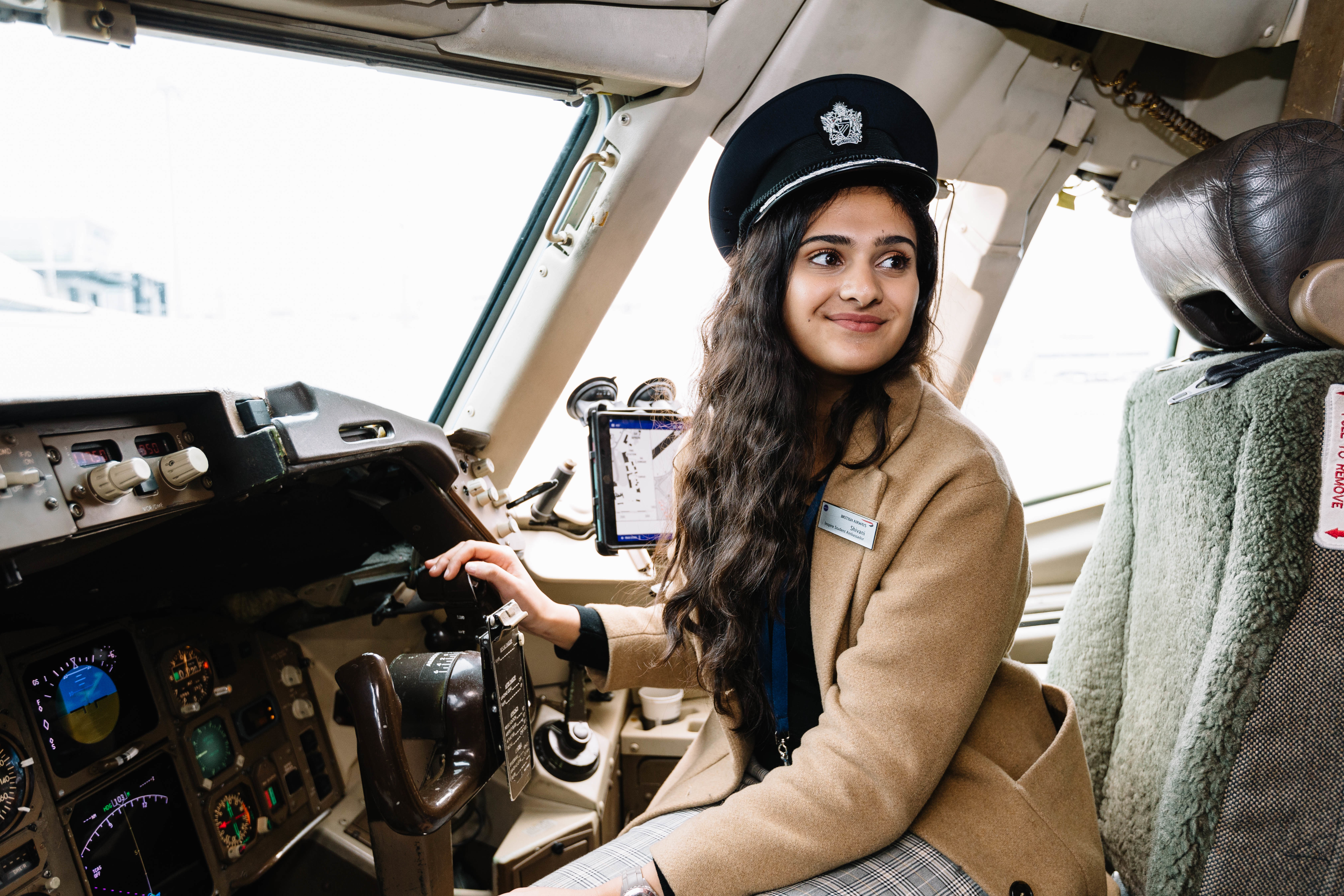Schools Visits & School Presentation Packs
The Customer First Team have produced comprehensive Powerpoint presentations for school children and school leavers. They have been approved by the BA Press Office and this means that the use of these files are restricted.
• You may use these files when personally making a presentation but they cannot be shared or published in anyway, except for the Teacher Information Pack which may be shared with Primary schools teachers and is only included here for your information.
• You may delete slides from the presentation but you may not add slides to the presentation as these would not have been approved by the Press Office for use.
No 2 presentation is aimed at children from 6/7+ and includes information on the history of flight, basic theory of lift, how a jet engine works, ATC, weather, a landing video and a "normal day in the life of a pilot". The Powerpoint presentation can be used for younger children with a more basic description of the subjects.
No 3 is aimed at being used at careers days to give an overview of the way to become a BA pilot and what the job is like and what to expect from the training and also the job.
No 4 presentation is aimed at children from 10+ and includes information on the history of flight, basic theory of lift, how a jet engine works, ATC, weather, a landing video and a "normal day in the life of a pilot". The Powerpoint presentation can be used for younger children with a more basic description of the subjects.
We advise that you look through the presentation and make your own notes before attending the school, we hope this is of some help and wish you all the best in front of a rather curious group of children.
We are in the process, alongside the Community Education Team and Flight Ops, in designing an App to track school visits and for safeguarding measures. In the meantime we ask that you contact [email protected] and complete this Safe Guarding Form before attending a school talk, it has some guidelines about safeguarding of children. The Inspire team might be able to provide you with further information before attending a school visit.
If you would like to become more involved in Inspire then please visit the Inspire homepage and have a look at what they are up to Inspire Page
British Airways have launched a dedicated site for students who want to get into the world of aviation, through it they can find mentors, and work through modules which will assist them on this path, as well as getting information about upcoming opportunities. Please share this with any young people who may be interested in a career in aviation. https://connectr.co.uk/ britishairways#home
For any BA female pilots looking to become more involved, please get in touch with us at the Customer First Team, [email protected] we are always looking for more mobile simulator volunteers to go to events, particularly school and STEM events. We want children to see more female pilots in uniform. ‘If she can’t see it, she won’t believe she can be it’.
BRITISH AIRWAYS PILOTS CAN DOWNLOAD SCHOOL PRESENTATION PACKS VIA THIS LINK:-
Becoming a Pilot
If you have an interest in becoming a pilot then here are some resources to get you started. To become a commercial pilot, you will need a licence, this could be a Commercial Pilot Licence (CPL) with a Multi Engine Instrument Rating (I/R) or a Multi Pilot Licence (MPL) or finally an Airline Transport Pilots Licence(ATPL). There are a number of ways to go about achieving one of these so you will need to see what works best for you. Training for a Licence averages about two years and can cost as much as £100,000. You will therefore need to research all your options before you commit to the path you will take to get there. To get into flying school you will need to have completed school and achieved decent grades. Flying schools will all have different requirements for actual grades or subjects required. British Airways current requirements are GCSE Maths, English and Science Grade C and above for all our programmes. You will also need to be able to obtain a Class 1 Medical Certificate. Your vision doesn’t need to be 20/20 but it does need to be correctable to that. It is worth taking your medical assessment before committing to anything to ensure you won’t later find something that would prevent you following this career path when you have invested money and time in it. There are a number of different ways to get into flying and there is no right answer, you need to do the research and find what works for you.
Integrated Course - Without any previous flying experience, an integrated course at a big flying school is a popular option. It takes you through an intensive ground school and flying programme to emerging nearly two years later with a frozen Airline Transport Pilot Licence(ATPL). This is an expensive option though so will need some thought as to how to pay for it. There is a limited number of scholarships available and these are worth looking into.
Modular Course - This route allows you to build flying hours while carrying on working. It can take longer than two years as it is usually done by breaking down a course into separate modules. This is a much cheaper option to follow and allows you to work and earn money while gaining your licence.
Multi Pilot Licence (MPL) - This allows you to act as a copilot on an aircraft that requires a copilot for commercial air transport. This is a relatively new route that involves a lot more simulator training than traditional routes, preparing you to fly as a copilot in an airline. It may be a little quicker and more cost effective than some traditional routes. The downside being your licence involves training in the standard operating procedures of one airline so you are generally committed to that airline until you have the hours logged to upgrade your licence to an Airline Transport Pilot Licence. It is usually offered by flight schools to candidates who have performed well in initial assessments and have gone on to be assessed by an airline.
Degree - There are a number of universities now offering a degree in Aviation that includes some element of flying training. The high costs of training still apply however you may be able to apply for government loans to assist with some of the costs. This option allows you to have a degree also, therefore offering employment opportunities.
Apprenticeship - The (Royal Aeronautical Society in association with ) have developed a pilot apprenticeship scheme that is being supported by the pilots union BALPA. There are as of yet no schemes in place but watch this space as companies with over 3000 employees are committed to investing a certain amount in apprenticeship schemes so hopefully we will start to see schemes rolled out shortly. Hopefully this will be a more cost effective route to entering aviation and will mean that a flying career is open to a broader spectrum of people.
Type Rating - Depending on the route you took into flying, you may now also need a type rating. This is a certification to fly a particular type of aircraft, it may make you more employable in the event you can’t get a job once you have done your initial licence.
British Airways Pilot Recruitment Page - https://careers.ba.com/future-pilots
The British Airline Pilots Association Guide to becoming a Pilot - https://www.balpa.org/ Becoming-a-pilot
The Aviation Skills Partnership whose aim is to open up aviation as a career to everyone from all walks of life - https://www.aviationskillspartnership.com
Royal Aeronautical Society, a professional body dedicated to the aerospace community, they have resources about getting into the sector and occasionally offer bursaries https:// www.aerosociety.com
Guild of Air Pilots and Air Navigators who occasionally offer bursaries - https://www.gapan.org/ Careers in Aerospace, an impartial guide with information on how to get into flying - https:// www.careersinaerospace.com/
The Civil Aviation Authorities information about obtaining a Class 1 medical https:// www.caa.co.uk/Commercial-industry/Pilot-licences/Applications/Medical/Apply-for-a-Class-1- medical-certificate/
Scholarship information
British Airways sponsors a number of gliding scholarships every year for young people living close to particular airports https://careers.ba.com/work-experience-inspire-gliding-scholarship
The Honourable Company of Air Pilots incorporating Air Navigator’s offer some scholarships https://www.airpilots.org/career-matters/scholarships/flying-scholarships-2019/
The Air League is a charitable venture who offer some scholarships and support https:// www.airleague.co.uk/scholarships
Royal Air Force Air Cadets offer some scholarships https://www.rafa.org.uk/what-we-do/air- cadets/flying-scholarships/
And there is the Royal Air Force University Squadron https://www.raf.mod.uk/our-organisation/ university-air-squadrons/
Flying Scholarships for Disabled People offer some scholarships for those that qualify https:// www.fsdp.co.uk/
Specifically for females interested in flying
The British Women’s Pilot Association http://bwpa.co.uk/
Not flying related but a social media platform allowing school aged girls to connect with Muses in STEM related careers www.modernmuse.org
A project aimed at inspiring young women to get involved in flying www.theaviatrixproject.com
MYTH BUSTERS
I’ve heard you need perfect eyesight to be a pilot?
• That may have been the case for fast jet pilots in the past but in commercial aviation you need to have eyesight correctable to 20/20 vision.
Do you need to be good at Maths and Science to be a Pilot?
• Neither of these is a requirement, having a background in these subjects might help your technical understanding but don’t be put off if you don’t and you are willing to work hard. Most flying schools don’t specify either as a requirement. Some airlines will include GCSE level Maths and Science for their own programs initially but that doesn’t mean you can’t work for someone else and get a job later in your career with the same airline when you have built up the flying hours required. There are many pilots with very varied backgrounds from Politics, to Geology and Geography!
Do I need a University Degree to be a Pilot?
• No, you need to have worked hard and attained good grades in school. A university degree might help you stand out from the crowd on your CV after training when applying for jobs but it is certainly not a requirement. Some universities now offer combined flying training and a university degree in aviation though.
Flying isn’t a job for girls
• A massive misconception we are trying to change. It is a great job for girls in the same way it is for boys. There is not many girls, but girls are equally capable of doing the job.
Integrated courses at flying school are better than modular courses
• The two routes through flying school are very different and both have positives and negatives. In the past the bigger airlines tended to hire from integrated courses rather than hiring people who had taken the modular route. Those people tended to get jobs at smaller airlines or had to pay for type ratings to get jobs and then they could move to the larger airlines later in their careers. That has changed now though as airlines such as British Airways have opened up employment opportunities to people who have followed both paths. Do your research into all paths and schools and choose what is right for you.
Do I need to be good at computer games to be a Pilot?
• No. You will need to have good hand eye coordination but otherwise you will receive great training to help you with the flying skills you will need. A good Pilot is one who can communicate well, is good at critical thinking and problem solving, has great people skills, is both a leader and a team player, knows their limitations, is calm under pressure, and can work hard as it requires a lot of study.
And a final note for parents whose offspring have their head in the clouds.. Make sure you do your research into the many paths there is to take to become a pilot. No one way is the best. Have your child look at all opportunities, military and commercial and then they can decide what is right for them.
Make sure to look at the safety record of any flying school you are researching, are they credible and recognised? Are they financially sound? Many a flight School has disappeared overnight. Are they seeking all payment up front or will it be in instalments as training progresses? Are all costs included? Will the school assist in job finding and the application process or have they got an association with an airline? Do they have payment plans or will they assist in helping you secure funding. Is there any professional loan schemes they can assist with? Hopefully the answers to these questions will help in this important decision.
Most of us who get to fly airplanes for a job would joke that it beats working for a living and that we are very lucky to do what we do. We do have the best office view in the world after all! It requires hard work and dedication, that will continue throughout your career with yearly medical exams and 6 monthly checks in a simulator. But it is an extremely rewarding job, that involves meeting new people, travel, being part of a team and of course the magic of flying.


